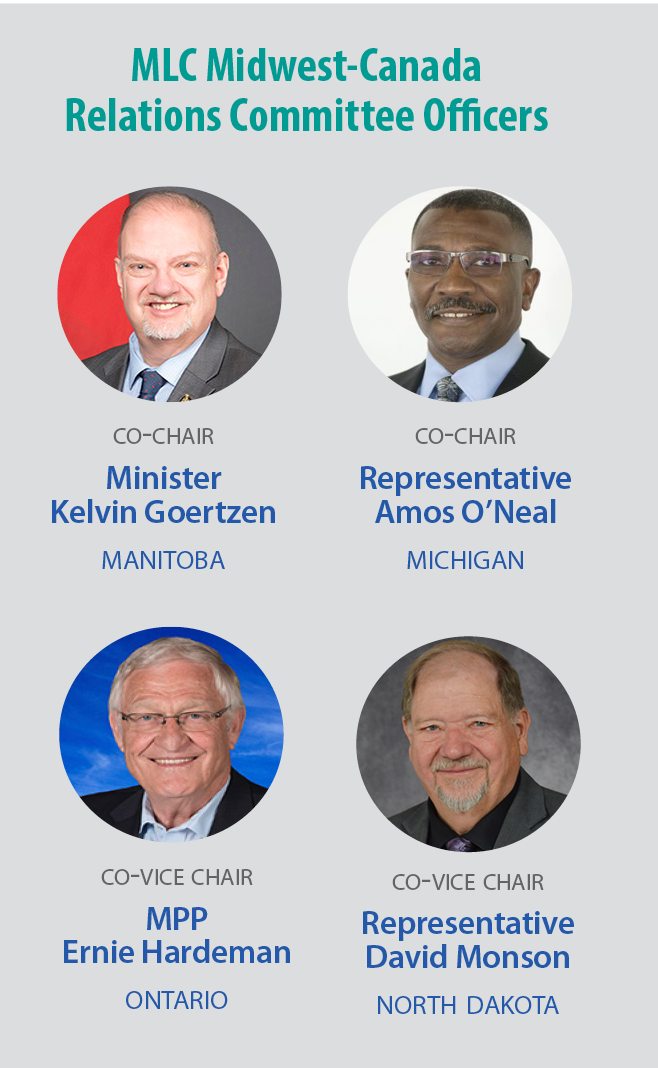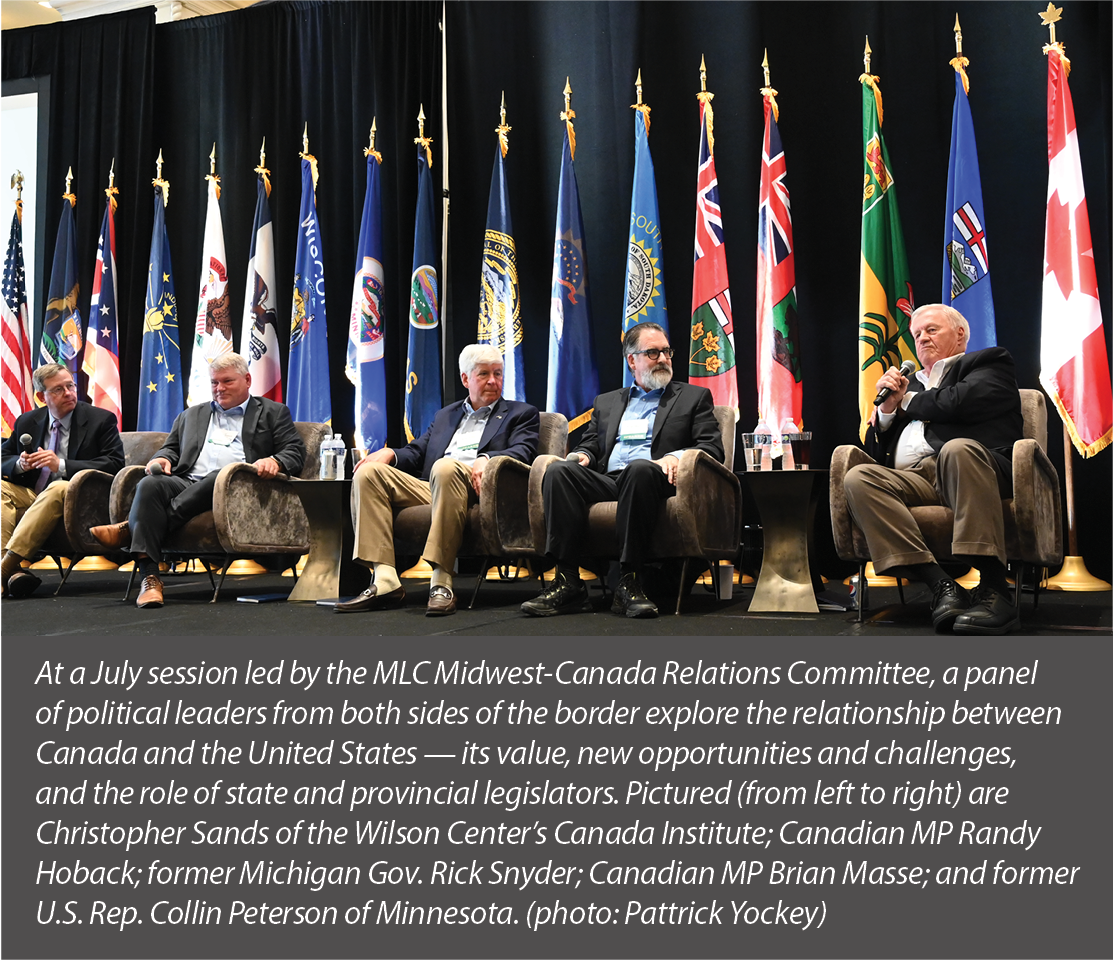A relationship worth working on: Region’s legislators can deepen cross-border economic, personal ties
What do a former Midwestern governor, a former chair of the U.S. House Agriculture Committee, a farmer-turned-member of the Canadian Parliament (MP), and a social worker-turned MP have in common?
They all believe deeply in the importance of the U.S.-Canada relationship.
 During a July session at the Midwestern Legislative Conference Annual Meeting, all four shared stories and insights on the role of state and provincial legislators in strengthening cross-border ties. Canadian MPs Randy Hoback (Saskatchewan) and Brian masse (Ontario) were joined on the panel by former Michigan Gov. Rick Snyder and former U.S. Rep. Collin Peterson (Minnesota).
During a July session at the Midwestern Legislative Conference Annual Meeting, all four shared stories and insights on the role of state and provincial legislators in strengthening cross-border ties. Canadian MPs Randy Hoback (Saskatchewan) and Brian masse (Ontario) were joined on the panel by former Michigan Gov. Rick Snyder and former U.S. Rep. Collin Peterson (Minnesota).
The session took place in downtown Detroit, just a few miles from the busiest crossing along the U.S.-Canada border.
On a single day, $2.6 billion in trade occurs between the two countries, Hoback noted, a system of open commerce that allows U.S. and Canadian businesses to make products together and opens markets for the Midwest’s agriculture producers, manufacturers and others.
During his time as governor, Snyder said, one of the most striking aspects of the relationship was how it defied party lines on issues such as trade and the Great Lakes. He worked equally well with Canada’s Liberal and Conservative leaders during an important juncture: negotiations over a new international crossing in the Detroit-Windsor area.
Masse thanked Snyder for his support of the Gordie Howe International Bridge, which is expected to open for traffic by 2025 and is the result of a deal reached in 2012 by Snyder and then-Prime Minister of Canada Stephen Harper.
Canada is paying for the design, construction and operation of the six-lane, 1.6-mile bridge. In return, Canada will have sole authority to charge tolls. The bridge is expected to make crossing times shorter and more reliable, an important development in helping maintain and expand this region’s cross-border supply chains.
But there are potential challenges ahead for the relationship as well.
Hoback, for instance, highlighted the upcoming six-year mandated review of the U.S.-Mexico-Canada Agreement in 2026; it’s a review that could pose risks (and rewards) to the two countries’ economic relationship, he said.
Masse noted, too, that there is ongoing pressure for governments on both sides of the border to compete against each other for jobs and businesses. One recent example: competition for a new battery plant that ultimately landed in Windsor.
“The auto industry pressured local, state and federal governments for incentives,” he said. “I don’t want to compete for auto jobs versus Michigan, Ohio, Indiana and other states. I want to compete for auto jobs [with] Europe and Asia and have us work harder together with regional policies in North America.”
 Despite the strength and longevity of the U.S.-Canada relationship, the panel and audience lamented the lack of knowledge that citizens of both countries, especially young people, have about the other country.
Despite the strength and longevity of the U.S.-Canada relationship, the panel and audience lamented the lack of knowledge that citizens of both countries, especially young people, have about the other country.
People living along the border, particularly political leaders, have the chance to change that, the panel said. Participate in binational events such as the MLC Annual Meeting, talk to someone you don’t know from the other country, and share best practices, Hoback said.
Or even steal an idea or two.
Early in the discussion, Snyder talked about organizing youth trips to the new Detroit-Windsor bridge to get students thinking about the two countries, bridge engineering and cross-border trade. Masse plans to take that idea and use it in Canada.
Likewise, Snyder challenged state and provincial lawmakers to find one action item on U.S.-Canada relations and apply it to their legislative work. There are plenty of items to choose from, as Snyder learned from plans for the new bridge as well as his six-year tenure leading the Conference of Great Lakes and St. Lawrence Governors and Premiers.
For those living near the border, MP Masse suggested hiring employees from both countries. (Some of his parliamentary interns are from Michigan.) Hoback encouraged families to explore study-abroad opportunities in Canada or the United States.
All of the panelists, too, recalled the days of easier border crossings and argued that an enhanced identification or driver’s license should be enough to cross the border — no passport required.
Finally, to build better cross-border relations, Peterson urged legislators to listen. He explained that the most successful people he knows are those who actively listen to and understand others.
Organized by the MLC Midwest-Canada Relations Committee, the panel discussion was moderated by Christopher Sands, director of the Canada Institute at the Wilson Center.
